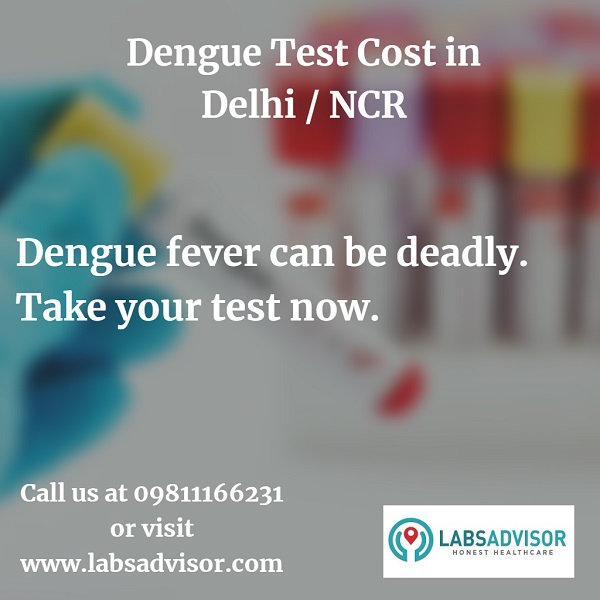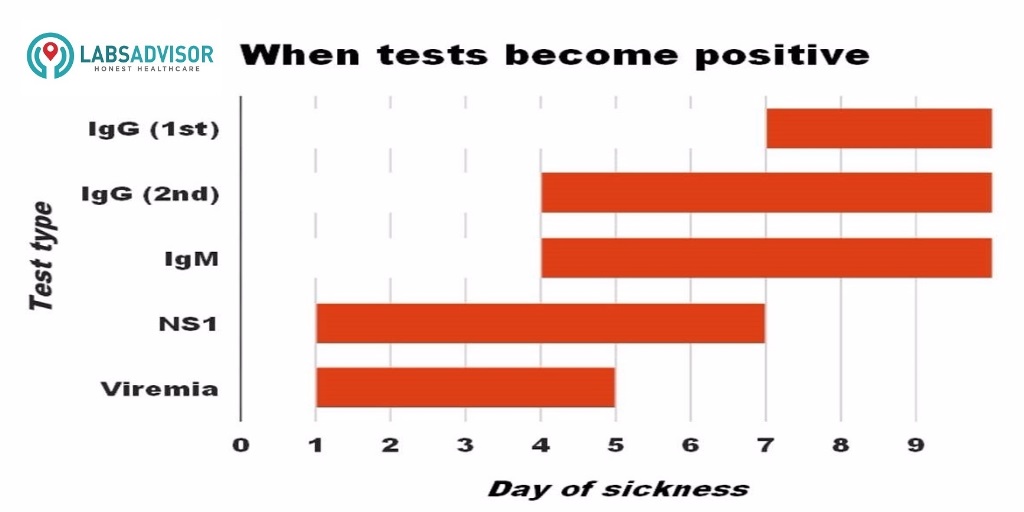Complete Guide of Dengue in Delhi / NCR
LabsAdvisor is a platform where you can find and compare the Dengue Test Cost in Delhi offered by different labs near you. You can book the lab that suits you. To know more about Dengue Test Cost in Delhi call us at +918061970525 or visit LabsAdvisor.com. You can book your dengue test cost in Delhi / NCR at a discounted price with LabsAdvisor. You can also book your Dengue Test at your home through LabsAdvisor.
What is the Dengue Test Cost in Delhi / NCR?
Below lists mentions the dengue test cost in Delhi / NCR offered by different labs. You can click the link and compare the cost of different labs near you. If you are not aware of the type of test you need to take in the given list, call us at +918061970525. You can also read the detailed guide on different types of dengue test at the end of the table.
Dengue Test Cost In Delhi | |
| Dengue NS1 Antigen Test cost in Delhi / NCR | ₹ 360 |
| Dengue IgG Test cost in Delhi / NCR | ₹ 450 |
| Dengue IgM Test cost in Delhi / NCR | ₹ 450 |
| Dengue IgM & IgG Test cost in Delhi / NCR | ₹ 870 |
| Dengue RNA PCR Test cost in Delhi / NCR | ₹ 1300 |
Dengue Tests Cost In Noida | |
| Dengue NS1 Antigen Test cost in Noida | ₹ 600 |
| Dengue IGG Test cost in Noida | ₹ 450 |
| Dengue IGM Test cost in Noida | ₹ 450 |
| Dengue IgM & IgG Test cost in Noida | ₹ 640 |
| Dengue RNA PCR Test cost in Noida | ₹ 1300 |
Dengue Tests Cost In Ghaziabad | |
| Dengue NS1 Antigen Test cost in Ghaziabad | ₹ 600 |
| Dengue IGG Test cost in Ghaziabad | ₹ 450 |
| Dengue IGM Test cost in Ghaziabad | ₹ 450 |
| Dengue IgM & IgG Test cost in Ghaziabad | ₹ 640 |
| Dengue RNA PCR Test cost in Ghaziabad | ₹ 1300 |
Dengue Tests Cost In Faridabad | |
| Dengue NS1 Antigen Test cost in Faridabad | ₹ 600 |
| Dengue IGG Test cost in Faridabad | ₹ 450 |
| Dengue IGM Test cost in Faridabad | ₹ 450 |
| Dengue IgM & IgG Test cost in Faridabad | ₹ 640 |
| Dengue RNA PCR Test cost in Faridabad | ₹ 1300 |
If you want our professional to call you back, click the button below. We will help in finding the suitable dengue test for you.
Complete guide on the above mentioned Dengue Blood Tests:
In line with the immunological response of body, tests for dengue try to identify presence of these antigen (Dengue NS1) or antibodies (IgM and IgG) or the virus type through genetic testing.
- Dengue Test NS1 Antigen – This test is recommended in the early stage of dengue viral infection as this antigen protein enters our body right from the start. Recommended time period for this test is from 2 to 8 days after infection because after this it may drop to undetectable level. But, please note that dengue NS1 antigen has certain limitations in accuracy.
- Dengue IgM – This test is recommended 4 to 14 days after you have a fever or other symptoms appear. This is one of the most commonly used tests and presence of Dengue-specific IgM antibodies indicates a recent dengue infection. IgM antibodies may remain high for many days after primary infection as it subsides after around 60-90 days of infection. One important limitation of this test is the cross reactivity with some other viruses, so in regions where some other viruses causing infections name as West Nile virus, Japanese encephalitis virus and Chikungunya virus are prevalent, diagnosis through this test requires caution.
- Dengue IgG – This test is recommended almost 10-14 days after the onset of symptoms and can be used to identify whether a patient is suffering from primary or secondary infection. A positive IgG result indicates patient had dengue viral infection at some point in past, as these IgG antibodies remain active in our body for a long time. If IgG test result is negative in the initial phase and positive later, it indicates primary infection. Whereas, if IgG test is positive in the initial phase and sensitivity increases more than 4X in at least 7 days, it indicates secondary infection.
- Dengue PCR – This is a genetic test and can detect the Dengue virus type through detection of virus RNA, so it is considered more accurate and therefore is more expensive also. This test must be conducted in the early phase (also known as febrile/ critical phase) when the virus is active in patient’s body, preferably within 5-7 days of infection.
Due to the overlaps of relevant time periods for these tests, limitations in accuracy and confusion over primary v/s secondary infection, often doctors tend to use Dengue NS1, Dengue IgM and Dengue IgG together to diagnose this infection. When different tests show positive results is displayed in the image below, which also offers an insight into how these test results should be interpreted. Viremia refers to virus identification or Dengue PCR test.
CBC (Complete Blood Count) Test or Platelet Count Test – Onset of Dengue fever drives down white blood cells and Platelet Count in blood. Dengue virus in the blood of our body seems to change the usual mix of blood so CBC test is used for preliminary investigation of Dengue and to monitor the platelet count through different phases of this disease.
What is Dengue?
Dengue is an infectious and dangerous viral disease found worldwide and is spreading rapidly. It can be deadly in some rare cases. Dengue is transmitted by the bite of the female Aedes aegypti mosquito. These mosquitoes bite during the day or early morning. Dengue fever is also known as breakbone fever due to severe pain in this disease. So be careful when you have a fever and suspected dengue infection, to get it checked immediately.
How Does it Impact our Body?
Dengue can be caused by 4 types of viruses, technically known as DV1, 2, 3 & 4. Generally, when a person suffers from Dengue, he/she develops immunity for that specific virus, but not the other Dengue viruses. If that person suffers from Dengue again (caused by other viruses), this disease can take severe form, so, much more caution and care is needed in cases of such secondary infections.
Our body’s immune system develops certain antibodies (IgM and IgG) in response to this viral infection. You can think of these antibodies as different types of defense teams or army contingents deployed by our body to fight off the enemy i.e. viral infection. So, this is a fight between the enemy soldiers (NS1 antigen) and our soldiers (IgM and IgG antibodies). Our body has a small amount of thousands of different antibodies. Each antibody is highly specialized to recognize a certain kind of foreign substance or antigen. These antibodies bind with antigens to make them inactive, so that other processes of our body can destroy and remove such enemy soldiers from our system.
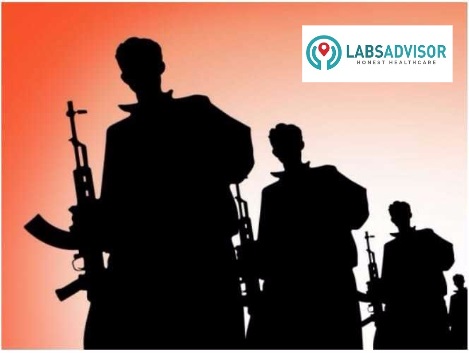
Dengue NS1 Antigen: This is a virus protein that enters our body with the virus and causes infection. This acts like a team of enemy soldiers, who infiltrate into our territory and then cause all kinds of problems, leading to symptoms of dengue viral infection.
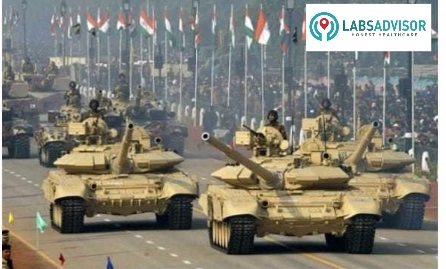
IgM Antibodies: These antibodies are produced by our immune system to fight the viral infection. These antibodies are like heavy artillery, e.g. tanks, so the deployment and effect of these antibodies rises with the intensity of viral infection and after a short time, after killing enemy soldiers, these tanks go back or go down in number in our body within 2-3 months. These antibodies are the largest in size and found in blood.
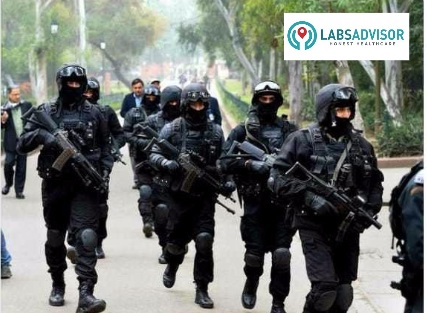
IgG Antibodies: These antibodies are produced by our immune system after some time, almost at the end of viral infection. These antibodies are like commandos, who are sent to clean up, ensure no enemy soldier is left and then protect our body from future infections, so their primary task is to guard against repeat visits of enemy soldiers. These antibodies are the smallest in size so can easily move across cell membranes and found in blood and other body fluids.
In case of secondary dengue infection, IgG antibodies are produced right from the start of infection, along with IgM antibodies. As more firepower is needed, both teams of soldiers – tanks and commandos are deployed right at the start, but tanks (IgM antibodies) don’t increase in numbers as high and remain active for a shorter duration as compared to primary infection. As commandos play a more important role in secondary infection, their number rises sharply in the early phase of infection.
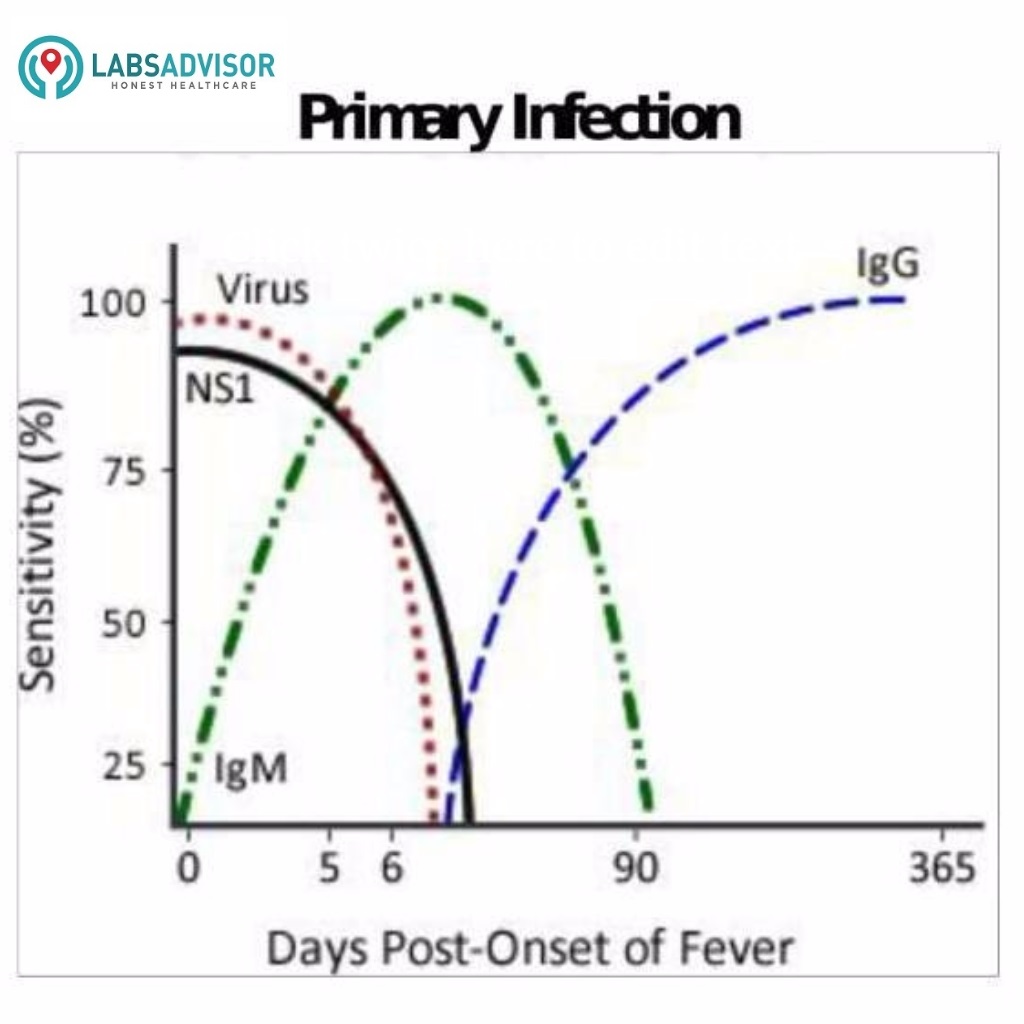
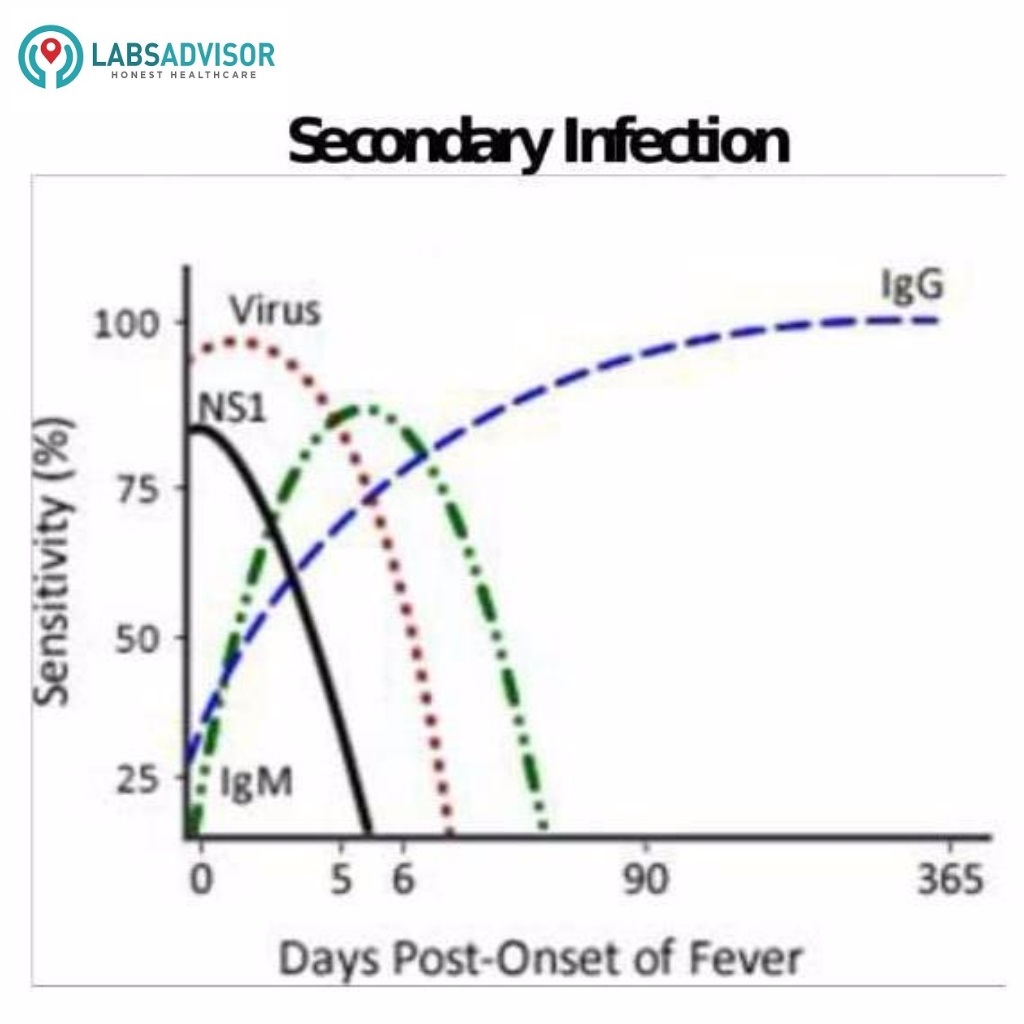
(Image Source: http://www.cdc.gov/dengue/clinicallab/laboratory.html)
Types of Dengue
There are three types of dengue – 1) Dengue Fever (DF), 2) Dengue Hemorrhagic Fever (DHF) and 3) Dengue Shock Syndrome (DSS). DHF and DSS are advanced stages of this disease and are found only in about 5% of total dengue cases.
- Dengue Fever (DF)
Symptoms of dengue fever are often visible in older children and adults. The fever usually lasts 3 to 7 seven days, but sometimes it may happen again. Main symptoms are as below:
Symptoms of Dengue Fever (DF)
- Pain in the head and behind the eyes
- Pain in the joints
- Bitterness in the mouth
- Loss of appetite
- Vomiting and diarrhea
- Rash on the hands and feet
- Hair loss
- Fatigue
- Dengue Hemorrhagic Fever (DHF)
Dengue hemorrhagic fever (DHF) is a terrible disease and an advanced form of dengue infection. If somebody suffers from dengue fever again, then the person is more likely to get DHF, which is more dangerous and deadly. So, if this is suspected, the patient should see a good doctor soon. Many symptoms of Dengue hemorrhagic fever (DHF) are similar to those of dengue fever, but later some other symptoms may appear as listed below.
Symptoms of Dengue Hemorrhagic Fever (DHF)
- Bleeding in gums, nose and skin
- Internal bleeding or blue or purple marks under the skin
- Low blood pressure
- Shock-like illness or coma
These symptoms start showing up 2 to 5 days after the fever. Patient’s health deteriorates rapidly after these symptoms show up and patient may die within 12 to 24 hours so quick action to consult a doctor or hospitalize is important.
- Dengue Shock Syndrome (DSS)
DSS is one of the severe conditions of dengue fever, in which patient may go in shock. If the person with dengue shock syndrome (DSS) can be made aware of the symptoms, the patient can be saved with proper treatment. But it is important to hospitalize the patient to ensure proper medical care. The symptoms are:
Symptoms of Dengue Shock Syndrome (DSS)
- Body and abdominal pain
- Weak pulse
- Feeling chills
- Blood vomiting
- Mental irritability
- Fluctuations in body temperature
- Low blood pressure
If any of these signs appear, then go to the doctor as soon as possible because it may cure fever, otherwise DSS can cause death within 24 hours. When condition of patient becomes serious, the platelets count decreases significantly.
Those who already have had dengue fever in past are more susceptible to suffer from dengue hemorrhagic fever and dengue shock syndrome. Nowadays serology (blood test) and polymer chain reaction (PCR) studies are available, to identify this disease.
Prevention / Treatment of Dengue
Vaccine for Dengue is going through final phases of testing and has been commercially launched in Mexico but is not widely available commercially and not so in India. There is no medicine to specifically treat this viral infection; however medicines can be used to manage the symptoms better as it takes its own time to subside. Following measures, along with drugs prescribed by the doctor may help:
- Do not let water accumulate at or around your home paying special attention to such cleanliness and hygiene
- Household utensils to be filled with water should be covered. If properly covered, dengue mosquito will not be able to grow
- Change the water every day in cooler, pots, etc. and if not needed, water cooler should be emptied and drained
- Wear clothes that cover your entire body to sleep and use the mosquito net
- Put kerosene in the water collected at home and use insecticide spraying medicine
- If small pits near the house are filled with water, then pour soil to avoid stagnant water
How to Book Dengue Blood Tests in Delhi / NCR?
You can book your Dengue tests with LabsAdvisor at discounted price. To book your Dengue Test Cost in Delhi / NCR call us at +918061970525 or visit LabsAdvisor.com.
There are some other articles that you may find useful
- To know complete details of Chikungunya, check here
- भारत में चिकनगुनिया की पूरी जानकारी
- दिल्ली में डेंगू की बीमारी की हिंदी में सम्पूर्ण गाइड
